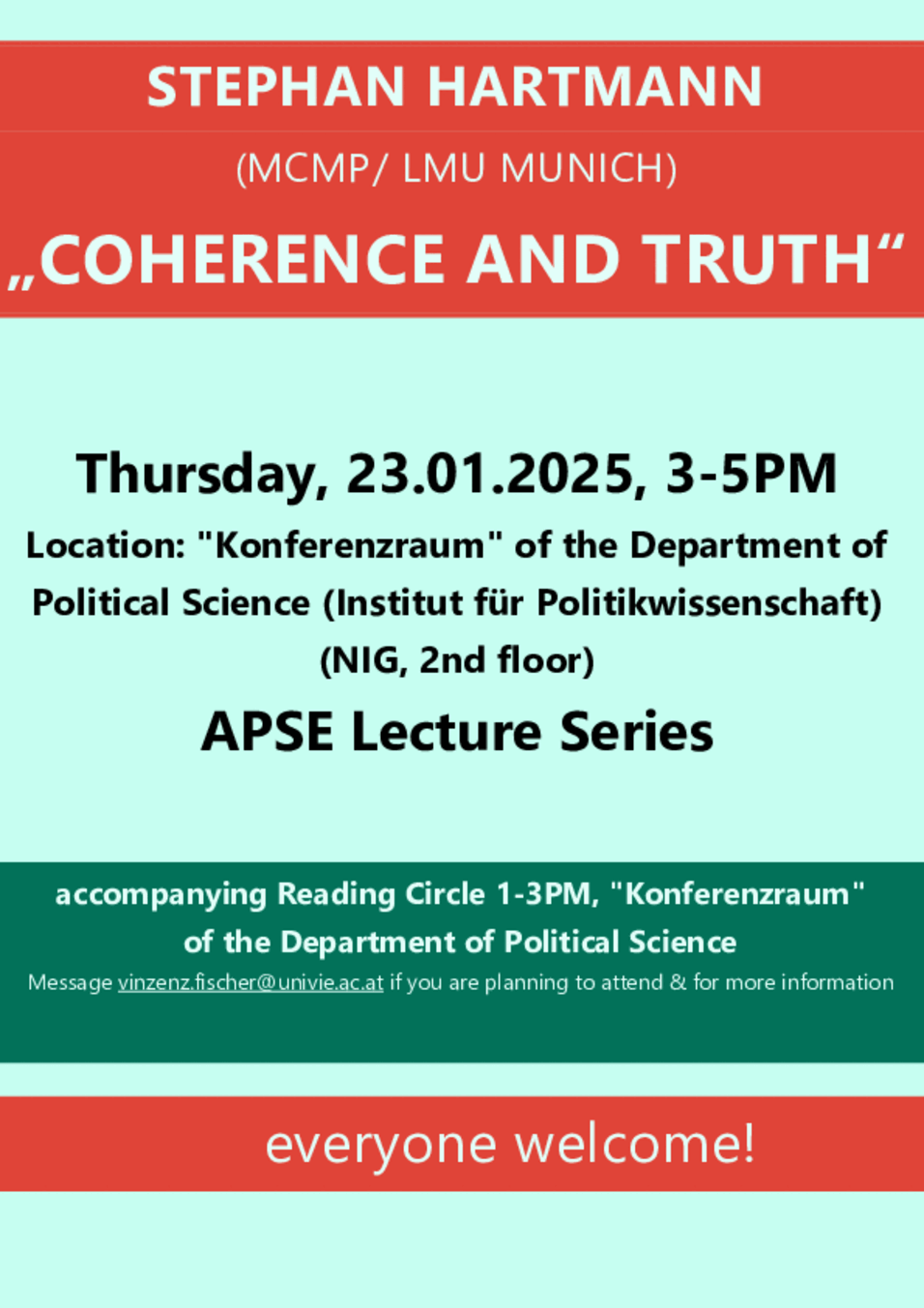Location:
Please note that both the Reading Cycle and the talk will exceptionally NOT take place in room 3A but in the "Konferenzraum" of the Department of Political Science (Institut für Politikwissenschaft). This room is located in the NIG, 2nd floor, in hallway A (the one at staircase 1). You can find the room on the floorplan here: Orientierung
Abstract
One of the most important questions in epistemology is what our knowledge of the world is ultimately based on. In this context, some epistemologists argue that there are fundamental beliefs that do not themselves require justification and on which all other beliefs depend. Coherence theorists reject this answer and argue instead that our knowledge is based on the mutual support of the propositions under consideration: If our beliefs add up to a coherent whole, then we have a reason for them to be true. It has also been argued that much of scientific reasoning relies on coherence considerations. In this talk, we will first outline the coherence theory of justification and discuss some of the reasons for and against it. In doing so, we will also address the central question of what coherence actually is. For this purpose, a Bayesian framework proves particularly useful, as coherence considerations are most effective in the domain of uncertainty. We will then take a closer look at the relationship between coherence and truth. To what extent is the coherence of a set of propositions an indicator of its truth? Answering this question leads to some old and new challenges for the coherence theorist. The talk concludes with a moderately optimistic assessment of the role of coherence considerations in everyday life and in science.
NEW: accompanying Reading Cycle
In addition to the APSE talk by Stephan Hartmann (MCMP/LMU Munich) "Coherence and Truth" we want to kindly invite you to our accompanying Reading Circle. It will take place right before the talk in the same room, so:
Time: Thursday, 23.01.2025, 1-3 pm
Location: "Konferenzraum" of the Department of Political Science (Institut für Politikwissenschaft).
We will focus our discussion on Chapter 2 of Stephan Hartmann's book:Bovens, Luc, and Stephan Hartmann, '2 Coherence', Bayesian Epistemology (Oxford, 2004; online edn, Oxford Academic, 20 Jan. 2005), https://doi-org.uaccess.univie.ac.at/10.1093/0199269750.003.0003 As introduction to the field, we suggest:Olsson, Erik, "Coherentist Theories of Epistemic Justification", The Stanford Encyclopedia of Philosophy (Winter 2023 Edition), Edward N. Zalta & Uri Nodelman (eds.), URL = <https://plato.stanford.edu/archives/win2023/entries/justep-coherence/>.For further reading regarding the topic:Especially Chapter 1 in:Bovens, Luc, and Stephan Hartmann, Bayesian Epistemology (Oxford, 2004; online edn, Oxford Academic, 20 Jan. 2005), https://doi-org.uaccess.univie.ac.at/10.1093/0199269750.001.0001 Titel anhand dieser DOI in Citavi-Projekt übernehmen, accessed 17 Jan. 2025.Hartmann, Stephan and Trpin, Borut (2023) Why Coherence Matters. Why_Coherence_Matters_preprint.pdfHartmann, S., & Trpin, B. (2024). A New Posterior Probability-Based Measure of Coherence. Proceedings of the Annual Meeting of the Cognitive Science Society, 46. Retrieved from https://escholarship.org/uc/item/30p8x5xhPlease send a quick message to vinzenz.fischer@univie.ac.at if you are planning to attend the Reading Cycle!
Feel free to bring your lunch!

